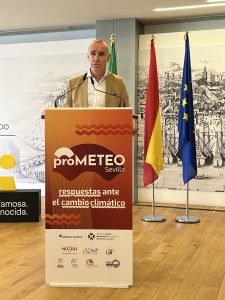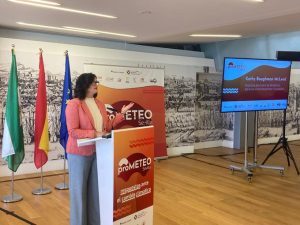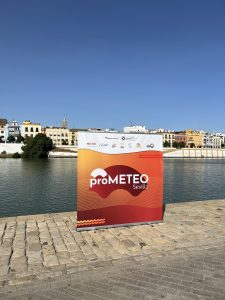Seville Becomes First City in the World to Name and Categorize Severe Heat Waves
proMETEO Seville, developed in collaboration with Arsht-Rock and a network of meteorological, scientific and academic partners links weather forecasts to health outcomes
Tue, Jun 21, 2022
SEVILLE, SPAIN — June 21, 2022 — Today, Antonio Muñoz, Mayor of Seville, and Kathy Baughman McLeod, SVP and director of the Atlantic Council’s Adrienne Arsht-Rockefeller Foundation Resilience Center (Arsht-Rock), unveiled proMETEO Seville: a pioneering heat wave naming and categorization system—the first weather warning system in the world to tie meteorological forecasts to health impacts. The city, which announced plans to establish the methodology last year, delivered on its pledge to pilot the system this summer, establishing Seville as the first city in the world to name and categorize heat waves.
proMETEO Seville is a collaboration between the City of Seville; Arsht-Rock’s Extreme Heat Resilience Alliance (EHRA) Science Advisory Panel—comprising leading climatologists, social and behavioral scientists, and public health and disaster relief experts—AEMET, Spain’s Meteorology Agency; the University of Sevilla; Pablo de Olavide University; the Carlos III Institute; the Spanish Office for Climate Change; and El Día Después.
“I want to thank the Adrienne Arsht Rockefeller Foundation Resilience Center for implementing this pilot project in the city. Seville needs to be a mirror in the adoption of measures against climate change, such as this initiative. We are the first city in the world to take a step that will help us plan and take measures when this type of meteorological event happens—particularly because heat waves always hit the most vulnerable,” said Antonio Muñoz, the Mayor of Seville. “The city government ratifies its commitment in the fight against climate change through the reduction of emissions and decarbonization, and second, through adaptation–to make Seville a resilient city with a model that truly tackles the big challenge of rising heat.”
As climate change continues to intensify the temperature, frequency and duration of heat waves, year after year, proMETEO Seville was devised to raise awareness and inform Seville’s residents about the dangerous effects of heat on human health by anchoring public awareness campaigns to a three-tiered category system integrated with the City’s emergency and disaster response plans.
Seville is in the Andalusia region, which is among the hottest regions in Spain, where temperatures easily soar above 40°C or 104°F. Each category– category one being the least severe to category three being the most – will trigger a distinct set of safety measures and policies, such as the opening of city pools and water parks, or the activation of a corps of community health workers tasked with checking on elderly and other at-risk individuals under the most dangerous heat conditions, to provide residents with the resources they need to protect themselves from the perils of extreme heat.
The categories are based on the expected excess danger posed by the temperature, humidity, and conditions in the 30 days preceding it. Heat waves designated as Category 3 events would be named in descending order from the last to first letter of the Spanish alphabet. The first five names for heat waves reaching a category 3 will be named:
- Zoe
- Yago
- Xenia
- Wenceslao
- Vega
“Today, Mayor Muñoz and Seville are leading the way by becoming the first city in the world to name and categorize heat waves. This new method, backed by 18 months of our science teams’ analysis and research and built with many global and local experts is intended to build awareness of this deadly impact of climate change – and ultimately save lives.”
“Today, Mayor Muñoz and Seville are leading the way by becoming the first city in the world to name and categorize heat waves. This new method, backed by 18 months of our science teams’ analysis and research and built with many global and local experts is intended to build awareness of this deadly impact of climate change – and ultimately save lives,” said Kathy Baughman McLeod, SVP and director of Arsht-Rock.
The efficacy of proMETEO Seville will be rigorously tested in a year-long feasibility pilot administered by the project partners. It is based on analysis of historical climate records and local health and mortality data for the city of Seville and powered by a novel algorithm that forecasts heat waves up to 5 days in advance of a heat event and automatically categorizes it based on its impact on human health and mortality.
Melbourne (Australia), Athens (Greece) and five U.S. cities — Los Angeles, Miami, Milwaukee, Kansas City and Missouri — have also begun work to pilot similar categorizing conventions using localized weather and public health data, and factoring in urban design features, urban heat island (UHI) effects, and other considerations.
About the Adrienne-Arsht Rockefeller Foundation Resilience Center
The Adrienne Arsht-Rockefeller Foundation Resilience Center (Arsht-Rock) builds individual and community resilience in the face of climate impacts. We pledge to reach one billion people around the world with resilience solutions to climate change by 2030. For more information please visit https://www.onebillionresilient.org/ or follow us on Twitter and LinkedIn.





